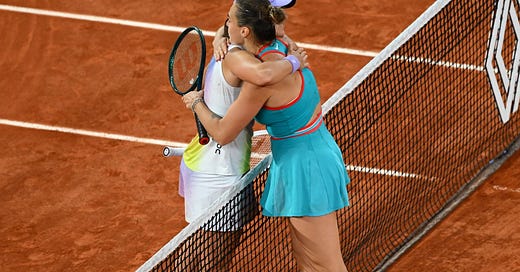Aryna Sabalenka (WTA #1) defeated Iga Swiatek (WTA #5) 7-6 [7:1], 4-6, 6-0 in the 2025 Roland Garros women’s top-half semifinal to qualify for a maiden Major final on natural surfaces and stop Swiatek’s French Open reign at 3 consecutive singles titles and 26 straight match wins.
Since Ashleigh Barty’s premature retirement in January 2022, Swiatek and Sabalenka have been the two most dominant players on the WTA Tour.
Forced to become the flag bearer overnight, Swiatek responded with a monumental 135-day, 37-match unbeaten run across the spring and early summer of 2022 and a Nadalesque superiority on clay that lasted through 2024.
Very high standards that Sabalenka finally caught up to when she made huge strides in her ability to keep emotions (and then shots) under control without sacrificing her offensive instincts. A major evolution in her power game that has made it increasingly more difficult to stop*.
* only Gauff seems to possess the formula that makes Sabalenka lose control and revert to a more frustrated and wayward version of herself
With Sabalenka perfecting her big-hitter identity, recent overall trends in women’s tennis and her own struggles against power players have left Swiatek with the urge to raise her aggression levels. Still a work in progress, its development is occasionally steering the Pole towards “identity crises” that drift her away from the unwavering solidity that was the basis of her game in past years.
The latest episode of this was seen in the Roland Garros semifinal. While Sabalenka was able to maximize her identity during 3 top-level stretches of first-strike tennis — first 5 games of the match, first set tie-break and finally the whole deciding set — Swiatek was hurt by an accumulation of unusual early-rally errors. Frequent mistakes that cut points short and denied the Pole the opportunity to take the match towards the single area she was utterly superior on the day: long rallies reaching 9+ shots, of which Swiatek won 8 of 10 (80%).
However, those only accounted for 6% of all points played. Instead, almost 80% of the match was composed of short points that gave Sabalenka a colossal 32-point advantage (82 to 50).
Another very interesting view of the match is provided by the following table, showing the most frequent ways each player won points.





